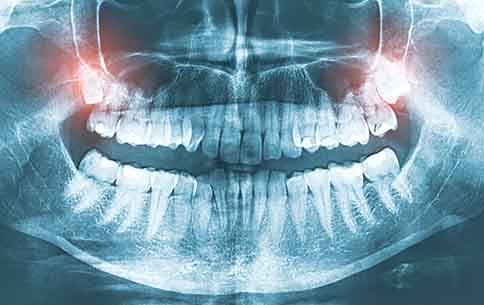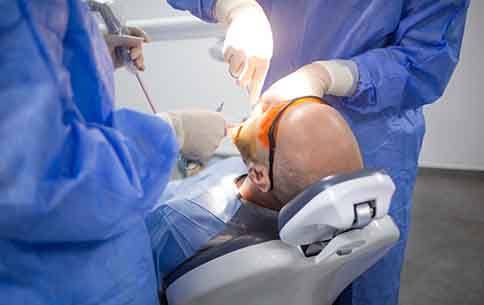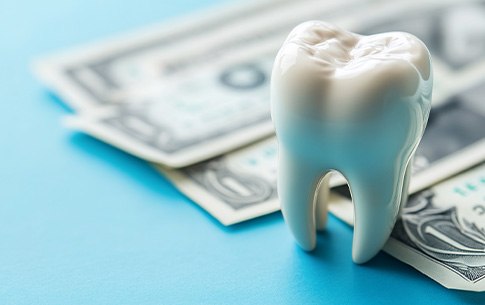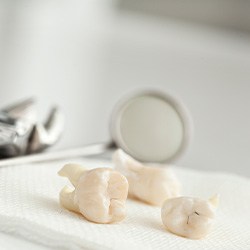Wisdom Tooth Extractions – Conway, SC
Quick & Comfy Wisdom Tooth Removal
It's generally best to keep all of your teeth, but third molars are often an exception. Leaving these pearly whites alone can cause health issues, putting your grin at risk. Thankfully, we at American Dental Care offer wisdom tooth extraction here in Conway. This procedure gets rid of your "extra" teeth, ensuring your smile remains safe, secure, and healthy. To learn more about it, please keep reading or book a consultation in the coming days.
Why Choose American Dental Care for Tooth Extractions?
- Dental Sedation That Keeps Patients Calm
- Gentle & Warm Dental Team
- CareCredit Financing Available
What are Wisdom Teeth?

Also known as “third molars,” wisdom teeth are the last ones to emerge. They typically erupt between the ages of 17 and 25 and sit in the back of your mouth.
Wisdom teeth are most notable for being largely unnecessary. While they once aided our human ancestors, they don't help people with modern diets. Still, not everyone gets such teeth – folks can have anywhere from none to all four of them. One’s third molars don’t always need removal, either.
Why Do Wisdom Teeth Need to Be Removed?

Wisdom teeth are only a concern when they threaten your smile. At that point, most dentists advise that they be removed to preserve your oral health.
Removal is most necessary when wisdom teeth lack space to erupt. Since people now have smaller mouths than their ancestors, they often don’t have room for third molars. That situation can cause third molars to become trapped in your gums, resulting in pain, infections, cysts, etc. An emerging wisdom tooth can also cause dental crowding, leading to a misaligned smile.
Often enough, patients who need wisdom tooth removal show signs like:
- Pain while eating
- Facial swelling
- Bad breath
- Jaw stiffness
- Difficulty opening the mouth
What to Expect from the Wisdom Teeth Procedure

Though wisdom tooth extractions vary by patient, they usually follow set steps based on whether the affected teeth have erupted.
Removal is fairly simple when the wisdom teeth have erupted. After numbing your mouth (using an anesthetic), our team will use an elevator to lift the relevant tooth. We’ll then rely on forceps to grip and wiggle it free of its socket.
If the wisdom tooth is impacted, you’ll need a more surgical approach. Talk to our team during your consultation to learn what that involves.
Recovering from Wisdom Teeth Extraction

Your mouth will feel a bit sore after your wisdom teeth are removed. To ensure you recover well, please use these after-care tips:
- Don’t drink through a straw for a few days.
- Take pain medications as needed.
- About 24 hours after surgery, rinse your mouth with salt water to clean the area.
- Avoid foods that are crunchy, hard, and sticky.
- Since they interfere with healing, stay clear of tobacco.
- Get ample rest for the best recovery time.
- During sleep, try to keep your head elevated.
- Use a cold compress or ice pack to decrease swelling.
Don’t hesitate to call us if something happens with your wisdom teeth. After all, we’re always ready to deal with third molars!
Understanding the Cost of Wisdom Tooth Extractions

One of the first questions on many patients’ minds when they learn they need to have a troublesome tooth extracted is how much it will cost. However, the total depends significantly on your unique circumstances, so our American Dental Care team can’t provide an accurate estimate until after your initial consultation.
Continue reading to learn more about how the price of your procedure is determined and how our office helps make this service more affordable!
Factors That Can Impact the Cost of Wisdom Tooth Extractions

You might not pay the same rate as someone else to have your troublesome tooth removed because the cost is based on various factors that can be affected by your individual situation, such as:
- How many wisdom teeth you have. Most people have four wisdom teeth; one for each quadrant of the mouth. But some people are born with fewer than that or don’t need to have them all removed, which can reduce the rate.
- Whether the teeth are impacted. Infected or impacted teeth may require a surgical procedure which comes with additional expenses.
- The types of medications used. If you receive sedation, like nitrous oxide, you’ll be responsible for paying for the amount used during your procedure.
- The severity of your condition. If your wisdom teeth require the oversight or attention of a specialist, you’ll need to pay for their services, too.
Does Dental Insurance Cover Wisdom Tooth Extractions?

Not all dental insurance policies include oral surgery, but many of them cover at least a portion of the cost of wisdom tooth extractions once the annual deductible has been met. But there’s no guarantee, so it’s worth verifying the details of your policy to know what’s offered and whether any additional restrictions, like a waiting period or a limited number of teeth that can be treated.
If you’re struggling to find the information or would like assistance with claims or applications, please let us know. Our friendly office staff is familiar with the process and can help you maximize your available benefits.
How to Make Wisdom Tooth Extractions Affordable

Removing troublesome wisdom teeth can protect and preserve your dental condition, but you might avoid scheduling your procedure if you’re concerned you can’t afford it. However, Dr. Murph and the rest of our team in Conway believe that everyone deserves access to top-quality services to protect their smiles.
That’s why we offer flexible payment plans through CareCredit. If your application is approved, you can divide your total invoice into more manageable installments over a designated period that are easier on your wallet.
Wisdom Tooth Extractions FAQs
Is Wisdom Tooth Removal Painful?
This is hands down one of the most asked questions, especially by patients who struggle with dental anxiety or who have had a bad experience in the past. If this sounds all too familiar, then we have good news: wisdom tooth extractions do not hurt. We can say this with complete confidence because the first step of the treatment process is numbing your mouth thoroughly. We also share aftercare instructions, like keeping your head elevated and taking OTC pain medication as directed, so the recovery period goes smoothly as well.
Does Everyone Have Wisdom Teeth?
Actually, no! In fact, an article that was published in the Dental Research Journal estimated that between 5% and 37% of patients are missing at least one wisdom tooth. Since the prevailing theory is that genetics plays a role, you may be missing one or more of your third molars if that was the case for your parents or grandparents.
With all of that said, just because you can’t see your wisdom teeth doesn’t mean you don’t have them. That’s one of the many benefits of taking annual X-rays! With insight into what’s going on underneath your gums, Dr. Murph can easily monitor their development and let you know if they need to be extracted.
How Should I Prepare for My Wisdom Tooth Extraction?
We mentioned above what you should do after your wisdom tooth extraction, but is there anything you should do to prepare? The short answer is “yes!” Here are a few steps we recommend taking:
- Asking someone you know and trust to drive you to and from your appointment
- Pick up everything you need for the recovery period, including soft foods
- Avoid tobacco products, alcohol, and sugary foods
- Get a good night’s sleep the night before
- Choose something comfortable to wear on the morning of the procedure
Should Wisdom Teeth Be Removed If They Don’t Hurt?
Perhaps one of the biggest misconceptions about wisdom teeth is that they only need to be removed if they are causing immense pain and discomfort. The reality is that they can dramatically increase your risk of infection and other oral health problems if they get trapped underneath the gumline or there isn’t enough room for them in your mouth. Plus, even if they aren’t causing you any discomfort right now, they could in the near future.
How Soon Can I Eat After Wisdom Teeth Removal?
You need to wait until the numbing agent has completely worn off, which usually takes a few hours. Once you’ve regained full sensation in your mouth, you can eat. Just be sure to stick to extremely soft foods, like cottage cheese and vegetable broth. It’s also important to check the temperature beforehand since the extraction site and the area surrounding it will be extremely sensitive.

